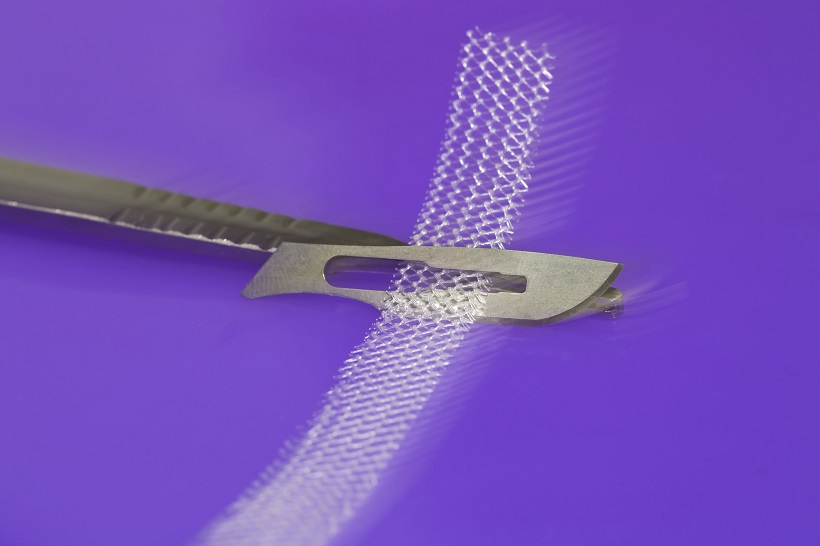
8 months after the use of surgical mesh was temporarily banned, those affected are still waiting for answers and solutions to their pain.
Kegel8 has rounded up the latest information on the mesh scandal. Read on to learn more.
Surgical Mesh Market Withdrawl
On 7 March 2019, surgical mesh manufacturer, Bard, announced that they would stop production of urogynaecological mesh.
The company said that their surgical mesh for urinary incontinence and pelvic organ prolapse is to be withdrawn from hospitals and distribution centres.
Bard have said that patients who have been implanted with these devices do not need to have them removed or checked. They are stopping production rather than continuing to invest in clinical data to support additional EU requirements.
Mesh and the Risk of Autoimmune Disease
A study from the journal of Best Practice & Research Clinical Rheumatology discovered that patients are more likely to develop symptoms of a systemic illness after a mesh operation.
“Polypropylene mesh implants may increase the risk of developing (auto)immune diseases by acting as an adjuvant.”
The study was carried out with 32 women and 8 men. A total of 40 patients developed symptoms of a systemic illness following a mesh operation.
These illnesses can include: Chronic fatigue, Myalgia, IBS, and Auto immunity syndrome.
The Safety of Mesh
On 28th February 2019, members of the House of Lords met to discuss the safety of medicines and medical devices. Surgical mesh was a hot topic during the debate, here’s a quick preview as to what was said:
Lord O’Shaugnessy:
“The number of procedures involving mesh is falling and certain categories of use are now banned.”
“Our methodology for discovering and verifying adverse events needs to improve.”
There is a need to “improve post-licensing surveillance of medicines and medical devices.”
There is a need for “properly funded and staffed national network of expert removal centres and surgical teams who can try to repair some of the damage that has been done.”
Lord Hunt of King’s Health:
“What is so striking is how long it has taken to get any action”
Baroness Cumberledge:
“The impact of mesh is not only on the woman herself but on her family.”

To watch the meeting in full, click here.
What are the Government doing about Mesh?
Health and Social Care Secretary, Matt Hancock, visited Norwich last week to speak to women affected by mesh. Mr Hancock had said:
“Hearing firsthand the stories of women who had been badly affected by surgical mesh implants is harrowing and lengths they have gone to try and identify the problem and try to have it fixed are extraordinary, this is a very significant problem we need to get to the bottom of.”
What Should I Do if I Have an Implant?
If you are concerned about the safety of your mesh implant, the International Consortium of Investigative Journalists recommends that “your first point of call should be the medical team that performed the operation.
“If you cannot go back to them, you should consult your primary care doctor.”
You can also call the mesh counselling hotline on 0121 314 7075, Monday-Friday 8am-6pm if you have been affected by mesh implants.
What are Mesh Implants Used For?
Mesh is a general term used to describe a variety of types of manufactured biological and synthetic implantable devices. It is used to support tissues in a number of surgical procedures. Most notably, mesh is used for surgical treatment of stress urinary incontinence and pelvic organ prolapse.
There are three main surgical procedures that can be performed to treat pelvic floor disorders:
- Transvaginal mesh for pelvic organ prolapse
- Transabdominal mesh for pelvic organ prolapse
- Mesh sling for stress urinary incontinence
What are the Complications of Mesh Implants?
For some women, mesh is an effective solution for treating pelvic floor disorders. However, some women also experience serious complications after enduring the procedure. Complications that can occur include:
- Mesh degradation – more surgery may be required to remove and replace the mesh
- Vaginal bleeding
- Vaginal discharge
- Damage to surrounding organs, e.g. bladder
- Infections
- Blood clot formation
- Further prolapse symptoms – requiring further surgery
Let us know your thoughts about the latest updates on mesh.
Previous Updates
Sources
[1] U.S Food and Drug Administration (2018) Urogynecologic Surgical Mesh Implants [online]. FDA [viewed 17/10/2018]. Available from https://www.fda.gov/medicaldevices/productsandmedicalprocedures/implantsandprosthetics/urogynsurgicalmesh/
[2] Bladder & Bowel Community (2018) Vaginal Mesh Support [online]. Bladder and Bowel Support Company [viewed 17/10/2018]. Available from https://www.bladderandbowel.org/surgical-treatment/vaginal-mesh-support/
[3] BMJ 2018;363:k4164. Available from: https://www.bmj.com/content/363/bmj.k4164?fbclid=IwAR3hguEMJspK_MzsQiW8DpMukJ2QcfSFZseomKQzpEQgHm0CRmeQ5vVFU8w
[4] BMJ 2018;363:k4155. Available from: https://www.bmj.com/content/363/bmj.k4155
[5] Tervaert, J.W.C. (2019) Autoinflammatory/autoimmunity syndrome induced by adjuvants (Shoenfeld's syndrome) in patients after a polypropylene mesh implantation. Best Practice & Research Clinical Rheumatology. Available from https://www.sciencedirect.com/science/article/pii/S152169421930004X?dgcid=rss_sd_all
[6] Hansard (2019) Safety of Medicines and Medical Devices [online transcript]. UK Parliament [viewed 07/03/2019]. Available from https://hansard.parliament.uk/Lords/2019-02-28/debates/5C15EA5D-06A3-4F43-90BE-A3FBE6225E54/SafetyOfMedicinesAndMedicalDevices
[7] Eastern Daily Press (2019) Health Secretary Matt Hancock visits Norwich [online]. Archant Community Media [viewed 07/01/2019]. Available from https://www.edp24.co.uk/news/health/health-secretary-matt-hancock-visits-norwich-1-5911957
[8] GOV.UK (2019) All Bard urogynaecological mesh – voluntary product withdrawal, implanted devices do not need to be removed (MDA/2019/014) [online]. GOV.UK [viewed 07/03/2019]. Available from https://www.gov.uk/drug-device-alerts/all-bard-urogynaecological-mesh-voluntary-product-withdrawal-implanted-devices-do-not-need-to-be-removed-mda-2019-014



